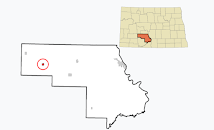 |
| Kyla Sanders wears many hats serving Glen Ullin's aging population. (Photo by Tim Evans, NPR) |
Glen Ullin, North Dakota, was once a bustling railway town, but as the town aged, its population steadily declined, leaving many older residents in need of extra help from fewer people. "Adults age 65 and older make up a third of Glen Ullin's roughly 700 residents," report Juliana Kim and Tim Evans of NPR. "The town's retired teachers, accountants and health care workers are making every effort to age at home, but one big obstacle for them is the ability to access medical care — without it, they are often forced to move to a larger city."
While rural populations skew older, the number of citizens available to help each other varies. Glen Ullin residents are working together, so the town's seniors get care without moving. Kim and Evans explain, "Each person plays a separate role — from keeping lonely older adults company to springing into action when a health emergency arises. In rural towns experiencing a loss of people, jobs and resources, this network of support can make a big difference."
The state's new pilot program "Aging in Community" is helping Glen Ullin and other towns address seniors' needs. Kyla Sanders is the program coordinator and her job is actually a lot of jobs. NPR reports, "Her list of responsibilities changes every day — from setting up internet at an older person's home to leading a flower arrangement class for a group of seniors to helping an older adult apply for Medicaid."
 | |
| Location of Glen Ullin, N.D. (Wikipedia map) |
For rural areas, having enough medical workers isn't the only barrier to helping seniors thrive at home. "Loneliness can have detrimental effects on physical health, including increased risk of heart disease, stroke and dementia, according to a report from the U.S. surgeon general," NPR reports. In Glen Ullin, the Rev. Gary Benz "spends his weekdays traveling to the homes of his aging parishioners who are too ill or weak to attend services. . . . Initially, the purpose was to bring them Holy Communion, but he quickly learned that they needed something else — connection."
No comments:
Post a Comment